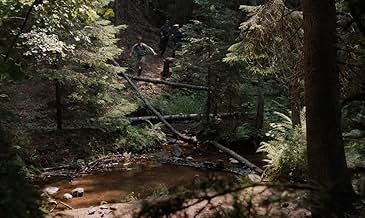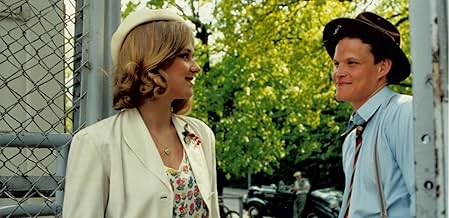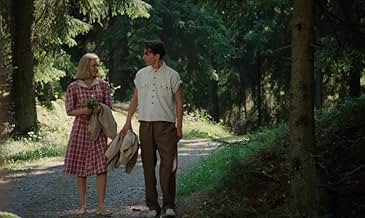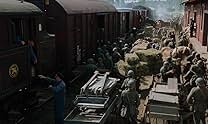1939
- 1989
- 3 Std. 13 Min.
IMDb-BEWERTUNG
6,1/10
1063
IHRE BEWERTUNG
Der Zweite Weltkrieg durch die Augen einer Stockholmer Kellnerin.Der Zweite Weltkrieg durch die Augen einer Stockholmer Kellnerin.Der Zweite Weltkrieg durch die Augen einer Stockholmer Kellnerin.
Empfohlene Bewertungen
This is a very decent movie, following the life of a waitress during the second world war in neutral Sweden. It's pretty cool to see how things went in Sweden in that time. I know this isn't a documentary, but still... Don't expect lots of action and suspense, but everyday struggles between a country girl and a city boy. Great acting and a good story...
This is a slow burner for sure. But it rewards a bit of patience so stick with it. The performances and casting are excellent and the characters are all three dimensional. In the course of three hours you get to know them and understand the changing world through their eyes. All of which makes one scene particularly shocking. It's always a good sign when a film stays with you after the credits roll and this one has. Maybe the slow pace matches the mood of lockdown but I thoroughly enjoyed it.
...should be around 7-8.
1939 is now available on Netflix worldwide having an audience 100 times more than in 1989 when was filmed. Quality is outstanding subsequent remastering.
The movie is maybe a bit too long, but not boring, great acting, interesting subject, reflecting actually Swedish people life during WWII, that being a neutral country was far better than life of French, Dutch, or Norwegian people. The only reason I don't give more than 8 stars is that finishes too suddenly letting you open to think about how might continue. What I liked especially is that everything happens during action is natural and not as in a soap movie.
1939 was a major project in the Swedish film industry. The Swedish people were invited to send in short descriptions of their own experiences during the war. The events depicted in the film are based on these stories. The main character, Annika, is based on a woman in real life, who travelled from Värmland to Stockholm to start a new life.
The film does create plausible images of what went on in Sweden during the war. The film also illustrates a time of transition, both for the world (from the old, safe environment to a new, unsecure one with prospects and dangers) and for the young people, who were forced to grow up quickly during this violent period of time. Everyone had to decide how to relate to the new world and what to do about their personal roots and beliefs. This is why I find the film so interesting.
I agree that 1939 can be considered slow at times, but I also happen to think that it is a tempo which suits the tale that is told. In my book, the key line is during one of the slower moments, when Annika's father says to Annika something along the lines of: "I am afraid of what's coming. Don't forget the old ways, Annika. Don't forget the way we used to live." Looking out over the meadows of his home, he realises that he is being left behind by the development, and that Annika and her peers are left at the helm. For me it is a thoroughly moving moment in the film. With the fast pace that we are living today, we would all do well to heed his plea.
This film didn't get the credit I think it merited, and at least for us Swedes 1939 should be considered an important film.
The film does create plausible images of what went on in Sweden during the war. The film also illustrates a time of transition, both for the world (from the old, safe environment to a new, unsecure one with prospects and dangers) and for the young people, who were forced to grow up quickly during this violent period of time. Everyone had to decide how to relate to the new world and what to do about their personal roots and beliefs. This is why I find the film so interesting.
I agree that 1939 can be considered slow at times, but I also happen to think that it is a tempo which suits the tale that is told. In my book, the key line is during one of the slower moments, when Annika's father says to Annika something along the lines of: "I am afraid of what's coming. Don't forget the old ways, Annika. Don't forget the way we used to live." Looking out over the meadows of his home, he realises that he is being left behind by the development, and that Annika and her peers are left at the helm. For me it is a thoroughly moving moment in the film. With the fast pace that we are living today, we would all do well to heed his plea.
This film didn't get the credit I think it merited, and at least for us Swedes 1939 should be considered an important film.
The Swedish historical drama "1939" was released in 1989 directed by Göran Carmback. "1939" is, in my opinion, a hidden jem that made me feel many emotions, while at the same time being fairly educational.
As the title tells, the movie set in the 20th century, capturing the whole war two timeline. The movie begins in 1939, the day Germany invade Poland, and ends the day germany surrenders, the day the world War ends. Containing the theme of the war, the movie isn't terribly graphic, even if the Nazis are in fact mentioned and shown, none of the crimes are shown and gone into the details of. It is notable that the movie is set in Sweden, and, Sweden being neutral, there aren't many mentions of the war's brutality, especially outside Sweden. The movie isn't mainly orientated around World War II, but it's represented in the way that affects swedes and their stance on the countries neutrality. I would definitely not call this movie a war movie, but it is historically accurate and informative to those that know little to nothing of Sweden during the war.
The movie "1939" is about three hours long, which is much more than the average movie. Although it feels like it should have been longer. The first hour and a half is orientated towards the main character's, Annika, life at home, her family, her own character, and, simply, her life. The first half of the movie allows the viewer to get to know the timeline, Annika and that people closest to her. However, the second half of the movie introduces the viewer to her later life, most importantly her blooming relationship. Here appear more personal issues, during which you can see the characters change, for some, mature. After watching Annika's and Bergt's early relationship and young love, it is shocking and even heartbreaking to watch their now married live's love shift. This toxic relationship of theirs, I feel like, is well represented, even roping the viewer into it. Here comes the benefit of the movie being so long, because of the previous two hours the viewer has gained some sort of attachment to the films characters, being able to feel emotions such as empathy, anger, or frustration, sadness and, of course, happiness as well. So far in the movie you've been able to memorise characters and recognise them throughout the movie since some reappear and then disappear again. I feel like this movie was incredibly beautiful. The scenery and atmosphere, the contrast between the big city of Stockholm and the farm, at the very edge of the country, at Wärmland, make the film beautiful. The film has many atmosphere scenes, with beautiful music and gorgeous Swedish views, not really contributing to the plot. These scenes are just enough and help you really get into the movie, it's atmosphere and themes. This movie felt slightly rushed in the end, however, it was still worth watching. This flaw can be overlooked by the beauty and the mixed themes of the movie. "1939" shows well represented days of womanhood, together with well written friendships. "1939" shows how a friendship forms develops and in the end matures. The friendship between two girls in cinema is rarely represented well, if even shown, however this movie does the job of representing two females being close friends really well. The movie shows the true colours of a complicated and toxic relationship without romanticising it. Together with a toxic relationship, in my opinion, also comes a slide theme of women's rights during the time of the movie.
When beginning to watch the movie, I originally thought it would be more World War II orientated, but I wasn't disappointed. For someone like me, that knows almost nothing about Sweden, I felt fairly educated after watching this movie. There are some scenes of Swedish people spreading their own opinions about the war or spreading their ideologies, helping you understand the country during World War II. Overall, I believe that this is a solid 9 out of 10 movie. I believe that this movie is incredibly beautiful and in its own way very well made, especially for its time, however I do feel like at the end it was slightly rushed.
As the title tells, the movie set in the 20th century, capturing the whole war two timeline. The movie begins in 1939, the day Germany invade Poland, and ends the day germany surrenders, the day the world War ends. Containing the theme of the war, the movie isn't terribly graphic, even if the Nazis are in fact mentioned and shown, none of the crimes are shown and gone into the details of. It is notable that the movie is set in Sweden, and, Sweden being neutral, there aren't many mentions of the war's brutality, especially outside Sweden. The movie isn't mainly orientated around World War II, but it's represented in the way that affects swedes and their stance on the countries neutrality. I would definitely not call this movie a war movie, but it is historically accurate and informative to those that know little to nothing of Sweden during the war.
The movie "1939" is about three hours long, which is much more than the average movie. Although it feels like it should have been longer. The first hour and a half is orientated towards the main character's, Annika, life at home, her family, her own character, and, simply, her life. The first half of the movie allows the viewer to get to know the timeline, Annika and that people closest to her. However, the second half of the movie introduces the viewer to her later life, most importantly her blooming relationship. Here appear more personal issues, during which you can see the characters change, for some, mature. After watching Annika's and Bergt's early relationship and young love, it is shocking and even heartbreaking to watch their now married live's love shift. This toxic relationship of theirs, I feel like, is well represented, even roping the viewer into it. Here comes the benefit of the movie being so long, because of the previous two hours the viewer has gained some sort of attachment to the films characters, being able to feel emotions such as empathy, anger, or frustration, sadness and, of course, happiness as well. So far in the movie you've been able to memorise characters and recognise them throughout the movie since some reappear and then disappear again. I feel like this movie was incredibly beautiful. The scenery and atmosphere, the contrast between the big city of Stockholm and the farm, at the very edge of the country, at Wärmland, make the film beautiful. The film has many atmosphere scenes, with beautiful music and gorgeous Swedish views, not really contributing to the plot. These scenes are just enough and help you really get into the movie, it's atmosphere and themes. This movie felt slightly rushed in the end, however, it was still worth watching. This flaw can be overlooked by the beauty and the mixed themes of the movie. "1939" shows well represented days of womanhood, together with well written friendships. "1939" shows how a friendship forms develops and in the end matures. The friendship between two girls in cinema is rarely represented well, if even shown, however this movie does the job of representing two females being close friends really well. The movie shows the true colours of a complicated and toxic relationship without romanticising it. Together with a toxic relationship, in my opinion, also comes a slide theme of women's rights during the time of the movie.
When beginning to watch the movie, I originally thought it would be more World War II orientated, but I wasn't disappointed. For someone like me, that knows almost nothing about Sweden, I felt fairly educated after watching this movie. There are some scenes of Swedish people spreading their own opinions about the war or spreading their ideologies, helping you understand the country during World War II. Overall, I believe that this is a solid 9 out of 10 movie. I believe that this movie is incredibly beautiful and in its own way very well made, especially for its time, however I do feel like at the end it was slightly rushed.
Wusstest du schon
- WissenswertesFeature film debut of both Helene Egelund and Per Morberg.
- PatzerWhen Annika travels home to her parents for Christmas, you see an aerial view of the train going through the woods. In the lower right corner of the screen you can see a part of the landing railing of the helicopter from which the scene was filmed.
- Crazy CreditsThe closing credits include an unusual job description: "Helena Olofsson-Carmback (as Helena Carmback) .... Shouting and whispering"
- VerbindungenEdited into Max Manus (2008)
Top-Auswahl
Melde dich zum Bewerten an und greife auf die Watchlist für personalisierte Empfehlungen zu.
- How long is 1939?Powered by Alexa
Details
Box Office
- Budget
- 30.000.000 SEK (geschätzt)
- Laufzeit3 Stunden 13 Minuten
- Sound-Mix
- Seitenverhältnis
- 1.66 : 1
Zu dieser Seite beitragen
Bearbeitung vorschlagen oder fehlenden Inhalt hinzufügen





























